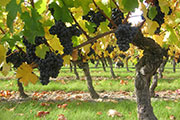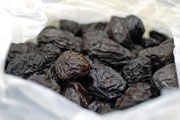SIPPIC Project:
 Project Objectives
Project ObjectivesThe SIPPIC project (Silicon For Integrated Crop Protection) is part of Ecophyto guidelines by proposing original biocontrol solutions, efficient and environmentally to fight against downy and powdery mildew.
-
Development of original formulations enriched silicon to fight against diseases of the vine
-
Proposal of a specific technical route of action adapted to the specialties contained in the formulations
-
Strengthening the value of innovation for sustainable agriculture
Project leader
Partners
- Institut Français de la Vigne > www.vignevin.com
- Groupe d’Etudes des Substances Végétales à activité Biologique > www.gesvab.u-bordeaux2.fr
- Biocontrol Laboratory > www.crh.ulaval.ca
- Polyphenols Biotech
- Encapsulation technologies
NEUROPHENOLS Project:

Web site: http://www.neurophenols.org/
BIOEXTRA Project:
 The objective of this project is the extraction of bioactive substances from pulp wood residue, currently a major waste product from the paper industry. The extracts are being tested for their potential as beneficial natural extracts for the cosmetic and the perfume industries as antioxidants and natural antimicrobial compounds. Green products (packaging formulation and composite) would also be developed for the food industry, wood construction protection, paper, and other functionalized composites.
The objective of this project is the extraction of bioactive substances from pulp wood residue, currently a major waste product from the paper industry. The extracts are being tested for their potential as beneficial natural extracts for the cosmetic and the perfume industries as antioxidants and natural antimicrobial compounds. Green products (packaging formulation and composite) would also be developed for the food industry, wood construction protection, paper, and other functionalized composites.
The multiple partners in this project include: Biolandes, the Centre Technique du Papier, the FCBA (Institut Technologique Forêt Cellulose Bois Ameublement), Smurfitt-Kappa Cellulose du Pin, Tembec R&D, Polyphénols Biotech, Georgia-Pacific and the ENSIACET (Toulouse). This project has been certified by the competitiveness clusters XYLOFUTUR (Aquitaine), AGRIMIP (Midi-Pyrénées), Fibres Grand-Est (Alsace-Lorraine) and AXELERA (Lyon).
PRUN'ACTIV Project:
 The effect of Agen’s prune consumption on metabolic diseases has just begun in collaboration with Maître Prunille, the Bureau Interprofessionnel du Pruneau, Berkem, Polyphenols Biotech, INRA (Theix) and Bordeaux 2 University. This study is being undertaken by Nutratech Conseils and is supported by the French governement and the Aquitaine region, with a budget of 3.3 million Euros (with 750 000 Euros for a clinical trial). The cost and the scale of this research project demonstrate a new emphasis given to classical agro-food industry. This project has been certified by the competitiveness cluster Prod’Innov in Aquitaine.
The effect of Agen’s prune consumption on metabolic diseases has just begun in collaboration with Maître Prunille, the Bureau Interprofessionnel du Pruneau, Berkem, Polyphenols Biotech, INRA (Theix) and Bordeaux 2 University. This study is being undertaken by Nutratech Conseils and is supported by the French governement and the Aquitaine region, with a budget of 3.3 million Euros (with 750 000 Euros for a clinical trial). The cost and the scale of this research project demonstrate a new emphasis given to classical agro-food industry. This project has been certified by the competitiveness cluster Prod’Innov in Aquitaine.
 FR
FR  EN
EN